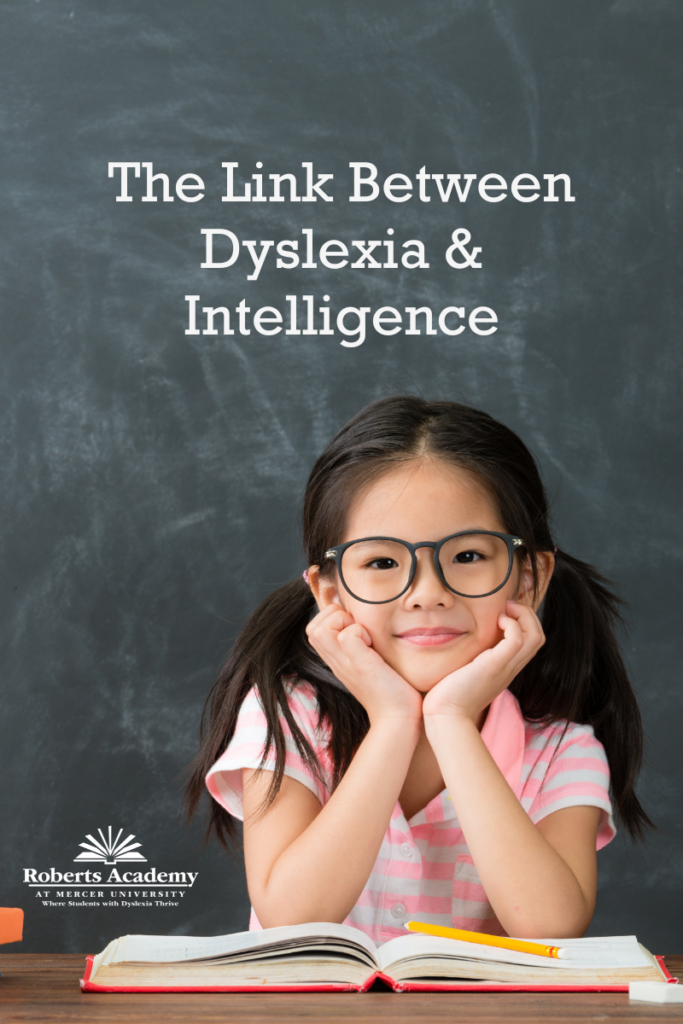“My child is so smart! Why can’t they read??” If you’ve ever thought this, you aren’t alone.
According to the National Assessment of Educational Progress, only 33 percent of American 4th graders can read proficiently.
And while there are numerous reasons for this astounding statistic, many of these children are likely dyslexic. In fact, 1 in 5 Americans have this common learning difference.
But is dyslexia tied to intelligence? And what does a dyslexia diagnosis mean for your child academically?
In this blog post, we’ll answer these questions and more.

According to the International Dyslexia Association (IDA), dyslexia is:
“… a specific learning disability that is neurobiological in origin. It is characterized by difficulties with accurate and/or fluent word recognition and by poor spelling and decoding abilities. These difficulties typically result from a deficit in the phonological component of language that is often unexpected in relation to other cognitive abilities and the provision of effective classroom instruction. Secondary consequences may include problems in reading comprehension and reduced reading experience that can impede growth of vocabulary and background knowledge.”
Dyslexia affects up to 20 percent of the population and represents 80–90 percent of all those with learning disabilities, according to The Yale Center for Dyslexia and Creativity.
Oftentimes, parents fear that a dyslexia diagnosis indicates their child is less intelligent than their peers. Nevertheless, dyslexia is not exclusive to any particular level of intelligence; it can affect individuals with average, above-average, and highly gifted intellect.
The IDA lists the following as common challenges associated with dyslexia:
And in her book, “Dyslexia: Wrestling With an Octopus: 10 Tips to Help Your Child, author Beth Beamish notes these early signs of dyslexia:
Please note: If your child encounters difficulties with any of the mentioned issues or exhibits any of the listed signs or symptoms, it does not necessarily mean they have dyslexia.
Nevertheless, if you suspect your child has dyslexia or another learning difference, talk with your child’s teacher and consult with an educational psychologist.
Curious about the signs and symptoms of dyslexia? Check out this blog post.
What does a dyslexia diagnosis say about your child’s intelligence?
First, let’s define the term “learning disability”.
According to the CDC, a learning disability or disorder is diagnosed when “… a child has difficulty in one or more areas of learning, even when overall intelligence or motivation is not affected.”
This means that in order to qualify for a diagnosis, a student must have an average to above average IQ. Yes – dyslexic students can be, and often are, gifted!
Note that while dyslexia is considered to be a learning disability, at Roberts Academy, we refer to it as a learning difference.
With the right tools, instruction, and learning environment, we know that dyslexic students can and will learn to read.
Learners who are highly intelligent but also have one or more learning or developmental disabilities are called “twice exceptional” or “2e.” Up to 6% of students served by the Individuals with Disabilities Education Act are 2e, according to the Davidson Institute.
But these learners often fly under the radar.
Why? Because they can leverage their strengths to mask and compensate for their difficulties, making their learning differences and challenges harder to spot.
On the flipside, their struggles with learning often make it harder to identify their giftedness.
Dyslexia is not a barrier to success. In fact, once learners are remediated, they often go on to be prolific scientists, athletes, entrepreneurs, artists, leaders, and more.
Here’s a short list of notable dyslexic individuals:
Roberts Academy at Mercer University is the only elementary school in Georgia outside of Metro Atlanta specifically crafted to cater to students with dyslexia.
As an independent transitional school, Roberts Academy’s primary objective is to equip students with the essential skills required for thriving in a traditional academic setting.
Upon completion of remedial programs, students will seamlessly reintegrate into their respective age-appropriate grades at schools chosen by their parents.
For more information regarding admissions and the application process, please visit us at robertsacademy.org.
Roberts Academy is now accepting applications!
Discover Roberts Academy at Mercer University in Macon, Georgia!